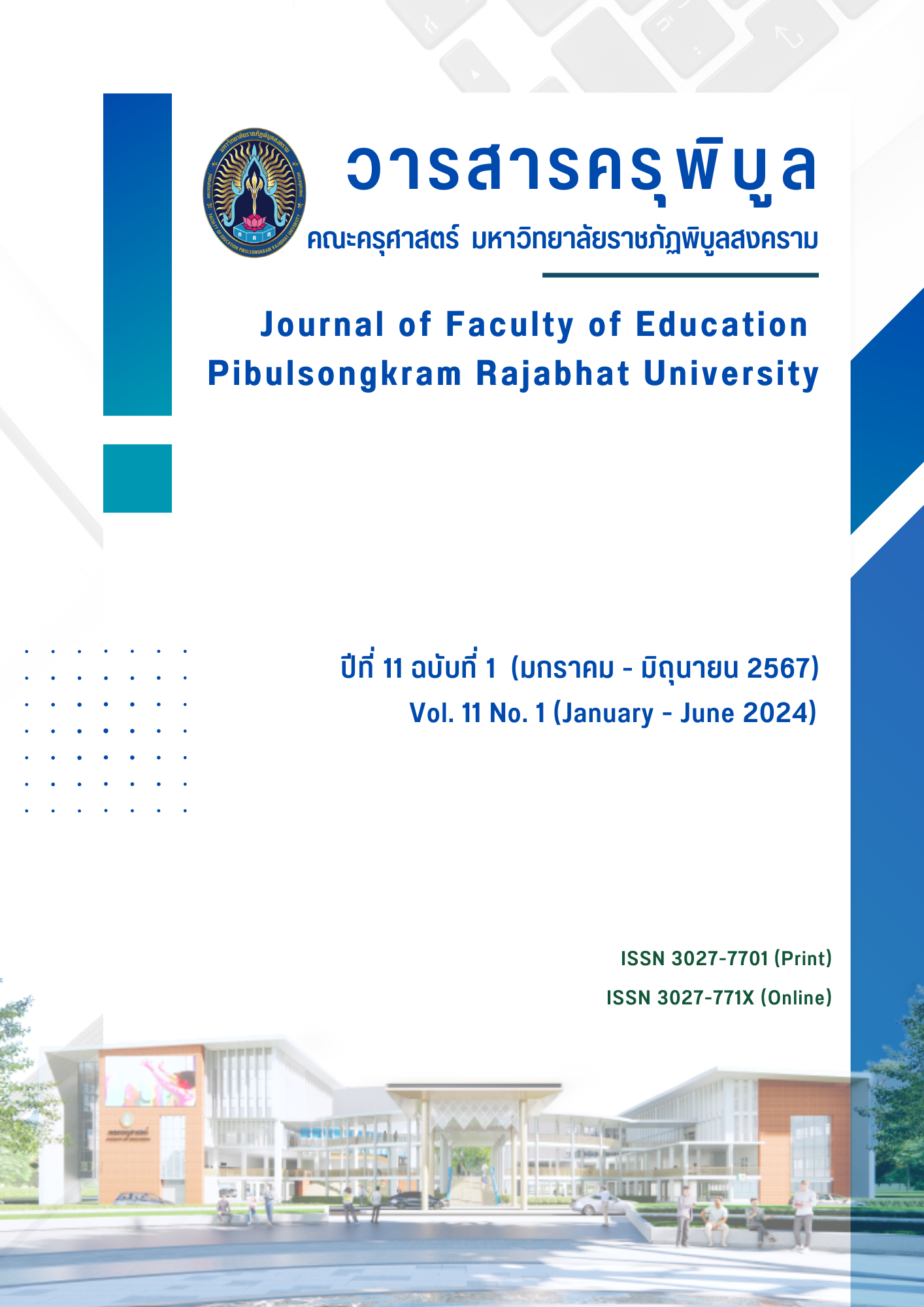DEVELOPMENT OF LIFE SKILLS IN STUDENTS THROUGH INTERGRATIVE GROUP COUNSELING
Keywords:
Life skills, Integrative group counseling, studentsAbstract
The aims of this research were: 1) to study the components of student life skills and to validate the consistency between the model of student life skills components created by the researcher and the empirical data; 2) to construct a group counseling model to develop the life skills of students; and 3) to study the results of using the integrative group counseling model to develop life skills by comparing results before the experiment, after the experiment, and during the follow-up period. The sample group in Phase 1 of the research consisted of 495 first-year students studying in the Faculty of Education at Rajabhat University in the northeastern of Thailand. Phase 2 included eight students from Phase 1 whose life skills were in the twenty-fifth percentile and below and who were willing to participate in the integrative group counseling sessions. The research instruments included a life skills scale with a construct reliability of 0.91 and the integrative group counseling model.
The research results found that
1. The measurement model consists of 4 components: self-awareness and self-acceptance, coping with problems, emotion and stress management, and interpersonal relationship skills. The model showed a good fit with the empirical data, with standard component loading weights between 0.71 - 0.81, all statistically significant at the .05 level. The component weights for the measurement model were as follows: emotion and stress management (0.81) had the highest weight, followed by self-awareness and self-acceptance (0.80), coping with problems (0.80), and interpersonal relationship skills (0.71).
2. The integrative group counseling model consisted of ten sessions: session 1-Rapport, session 2-Self-awareness, session 3-Self-acceptance, session 4-Coping with problems, session 5-Solving problems, session 6-Emotion management, session 7-Relaxation, session 8-Interpersonal relationships, session 9-Empathy, session 10-Conclusion.
3. The integrative group counseling effectively developed students' life skills, as evidenced by significantly higher life skills scores after the experiment and during the follow-up period compared to before the experiment, statistical significance at the .05 level.
References
กระทรวงการอุดมศึกษา วิทยาศาสตร์ วิจัยและนวัตกรรม. (2565, 15 เมษายน). สถิตินักศึกษาปีการศึกษา 2564. https://info.mhesi.go.th/
ประภาภรณ์ นิลสม, เพ็ญนภา กุลนภาดล และระพินทร์ ฉายวิมล. (2554). การพัฒนาทักษะชีวิตในการป้องกันความรุนแรงของนักเรียนอาชีวศึกษาระดับประกาศนียบัตรวิชาชีพโดยการให้คำปรึกษากลุ่มตามแนวทฤษฎีเกสตัลท์. วารสารคณะพยาบาลศาสตร์ มหาวิทยาลัยบูรพา, 19(3), 65-76.
พูลพงศ์ สุขสว่าง. (2556). โมเดลสมการโครงสร้าง. วัฒนาพาณิช.
วิระญา กิจรัตน์, ภัทราวดี มากมี และปิยทิพย์ ประดุจพรม. (2561). การพัฒนาเกณฑ์การประเมินทักษะชีวิตสำหรับนักศึกอาชีวะศึกษา: การวิเคราะห์โมเดลพหุระดับแบบผสมผสานวิธี. วารสารเทคโนโลยีภาคใต้, 11(1), 41-50.
ศญาดา ด่านไทยวัฒนา. (2565). ภาวะซึมเศร้าในวัยรุ่นกับบทบาทอาจารย์. วารสารวิทยาศาสตร์สุขภาพ วิทยาลัยนครราชสีมา, 1(2), 54-64.
สมบูรณ์ สุริยวงศ์. (2550). การวิเคราะห์องค์ประกอบ. มหาวิทยาลัยรามคำแหง.
สุกัญญา สุรังษี, ลัดดา เหลืองรัตนมาศ และสรวงทิพย์ ภู่กฤษณา. (2562). การพัฒนาโปรแกรมทักษะชีวิตเพื่อเสริมสร้างความแข็งแกร่งในชีวิต สำหรับนักศึกษาพยาบาล. วารสารพยาบาลกระทรวงสาธารณสุข, 29(3), 194-204.
สำนักงานกองทุนสนับสนุนการเสริมสร้างสุขภาพ. (2565, 29 เมษายน). รายงานประจำปี 2564 สำนักงานกองทุนสนับสนุนการสร้างเสริมสุขภาพ (สสส.). https://www.thaihealth.or.th/?p=194176
อติญาณ์ ศรเกษตริน, อัจฉราวดี ศรียะศักดิ์, จุฬารัตน์ ห้าวหาญ และสุทธานันท์ กัลป์กะ. (2564). การศึกษาทักษะชีวิตของนักศึกษาพยาบาลวิทยาลัยพยาบาลพระจอมเกล้าจังหวัดเพชรบุรี. วารสารหัวหินเวชสาร, 1(1), 1-11.
Balaman, F., Bolat. Y., and Bas, M. (2018). A Comparison of Life Skill Levels between Students of Education Faculty and Students of Pedagogical Formation. European Journal of Education Studies, 4(5), 75-91.
Black, N., and Mullan, B. (2015). An intervention to decrease heavy episodic drinking in college students: the effect of executive function training. Journal of American college health, 63(4), 280–284. https://doi.org/10.1080/07448481.2014.990969
Buchert, L. (2014). Learning needs and life skills for youth: An introduction. Journal of Lifelong Learning, 60(2), 163-176. https://doi.org/10.1007/s11159-014-9431-3
Corey, G. (2022). Theory and practice of group counseling. (10thed.). Cengage Learning.
Fadum, E. A., Carlsen, E. O., Ramberg, M., Strand, L. A., Haberg, S. E., and Martinussen, M. (2021). Social and Life Skills in adolescents who have self -harmed: analysis of survey responses from a national sample of adolescents in Norway. BMJ open, 11(11), 1-8. https://doi.org/10.1136/bmjopen-2021-054707
Hough, M. (2014). Counseling skills and theory. (4thed.). Hodder Education an Hachette UK Company.
Haug, S., Paz Castro, R., Meyer, C., Filler, A., Kowatsch, T., and Schaub, M. P. (2017). A Mobile Phone-Based Life skills Training Program for Substance Use Prevention Among Adolescents: Pre-post Study on the Acceptance and Potential Effectiveness of the Program, Ready4life. JMIR MHEALTH AND UHEALT, 5(10), 1-14. https://doi.10.2196/mhealth.8474
Israngkul na Ayudthaya, P., Chavez, G. S., and Seelaungsawat, L. (2019). Enhancing the 21st Century Life Skills Of University Students Using Whole Brain Literacy, Experiential Learning Theory, And Appreciative Inquiry: An Action Research For Assumption University. The Scholar: Human Sciences, 11(2), 196-210. http://www.assumptionjournal.au.edu/index.php/Scholar/article/view/3479
Jacobs, E. E., et al,. (2015). Group counseling strategies and Skills (8th ed.). Cengage Learning.
Klein, R. H. (2008). Toward the establishment of evidence – based practices in group psychotherapy. International Journal of group psychotherapy, 58(4), 441-454. https://doi.org/10.1521/ijgp.2008.58.4.441
MacLeod, C., and Hayden, P. (2016). Skills for learning: a day in the life of a college student. Learning and Teaching in Higher Education: Gulf Perspectives, 13(2), 31-52. https://dx.doi.org/10.18538/lthe.v13.n2.243
Mohammadzadeh, M., Awang, H., Ismail, S., and Kadir Shahar H. (2019). Improving emotional health and self-esteem of Malaysian adolescents living in orphanages through Life Skills Education program: A multi-centre randomized control trial. PLoS ONE, 14(12), 1-18. https://doi.org/10.1371/journal.pone.0226333
Moshki, M., Hassanzade, T., and Taymoori, P. (2014). Effect of Life Skills Training on Drug Abuse Preventive Behaviors among University Students. International journal of preventive medicine, 5(5), 577–583.
Norcross, J. C., and Goldfried, M. R. (Eds.). (2019). Handbook of psychotherapy integration (3rd ed.). Oxford University Press. https://doi.org/10.1093/med-psych/9780190690465.001.0001
Shulman, L. (2011). Dynamics and skills of group counseling. University at Buffalo (SUNY) Brooks/Cole, Cengage Learning
UNICEF. (2017, June 18). UNICEF for every child, Annual Report 2016. https://www.unicef.org/reports/unicef-annual-report-2016
Vergara-Torres, A. P., Ortiz-Rodríguez, V., Reyes-Hernandez, O., Lopez-Walle, J. M., Morquecho- Sánchez, R., and Tristán, J. (2022). Validation and the Life Factorial Invariance of Skills Ability Scale in Mexican Higher Education Students. Sustainability, 14(5), 1-13. https://doi.org/10.3390/su14052765
Williams, C., Neil, R., Cropley, B., Woodman, T., and Roberts, R. (2022). A systematic review of sport-based life skills programs for young people: The quality of design and evaluation methods. Journal of Applied Sport Psychology, 34(2), 409–435. https://doi.org/10.1080/10413200.2020.1792583
World Health Organization. (2020). Life skills education school handbook: prevention of noncommunicable diseases: introduction. https://iris.who.int/handle/10665/331948
Wrahatnolo, T., and Munoto. (2018). 21st centuries skill implication on educational system.
IOP Conference Series: Materials Science and Engineering (Online), 296(1), 6 p. https://dx.doi.org/10.1088/1757-899X/296/1/012036

Downloads
Published
Issue
Section
License
Copyright (c) 2024 คณะครุศาสตร์ มหาวิทยาลัยราชภัฏพิบูลสงคราม

This work is licensed under a Creative Commons Attribution-NonCommercial-NoDerivatives 4.0 International License.
ลิขสิทธิ์เป็นของคณะครุศาสตร์ มหาวิทยาลัยราชภัฏพิบูลสงคราม

